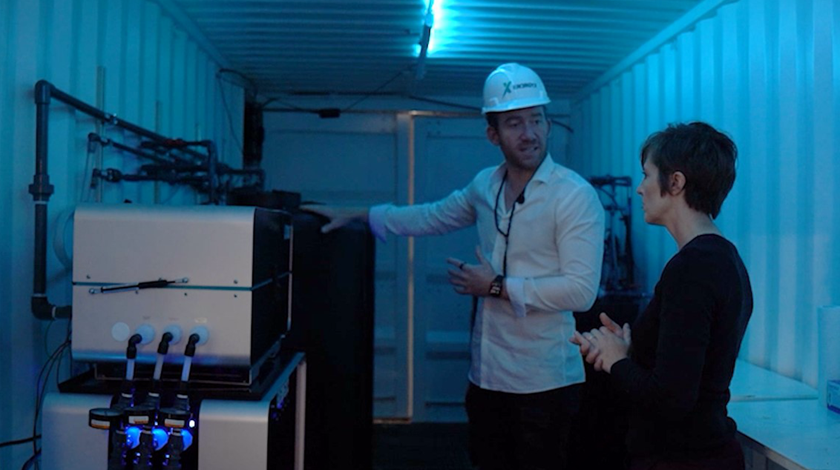Lighten your load with these lightweight LiFePO4 rechargeable batteries: high energy density, compact size and easy mobility
As technology continues to advance, so do the batteries we use to power our devices. Lithium iron phosphate (LiFePO4) rechargeable batteries are a relatively new technology that offers significant benefits over traditional lead-acid batteries. In this article, we will discuss the advantages of LiFePO4 rechargeable batteries, their lightweight design, high energy density, compact size, and easy mobility.
Advantages of LiFePO4 Rechargeable Batteries
Compared to traditional lead-acid batteries, LiFePO4 rechargeable batteries have several advantages. First and foremost, they offer a much higher energy density, which means more power can be stored in a smaller and lighter battery. Additionally, these batteries are much more reliable and durable than lead-acid batteries, as they do not suffer from the same issues with sulfation or acid stratification that can occur with traditional batteries. They also have a longer lifespan, with an expected lifespan of up to 10 years or more. Finally, LiFePO4 batteries are also considered safer than traditional batteries, as they are less likely to overheat or catch fire during charging.
Lightweight Design
One of the most significant advantages of LiFePO4 batteries is their lightweight design. Because they have a higher energy density than lead-acid batteries, they can store more power in a smaller and lighter package. This makes them ideal for use in applications where weight is a concern, such as in electric vehicles, solar power systems, and portable electronic devices.
High Energy Density
As mentioned above, LiFePO4 batteries have a higher energy density than traditional lead-acid batteries. This means that they can store more power in a smaller and lighter package. This makes them ideal for use in electric vehicles, where weight and size are critical factors in maximizing range and performance. They are also increasingly being used in renewable energy storage systems, where a high energy density is necessary to store large amounts of power in a small space.

Compact Size
Another advantage of LiFePO4 batteries is their compact size. Because they can store more power in a smaller package, they take up less space than traditional lead-acid batteries. This makes them ideal for use in applications where space is limited, such as in portable electronics or solar power systems.
Easy Mobility
Finally, LiFePO4 batteries are also incredibly mobile. Because of their lightweight design and compact size, they are easy to move around and transport. This makes them ideal for use in portable electronic devices, as well as in outdoor and off-grid applications, where mobility is essential.
결론
In conclusion, LiFePO4 rechargeable batteries offer significant advantages over traditional lead-acid batteries in terms of energy density, reliability, durability, safety, and weight. Their lightweight design, high energy density, compact size, and easy mobility make them ideal for use in a wide range of applications, including electric vehicles, renewable energy storage systems, portable electronic devices, and outdoor and off-grid applications. If you’re in the market for a new battery, consider upgrading to a LiFePO4 rechargeable battery to experience the benefits of this cutting-edge technology.

-
 최근 몇 년 동안 리튬 배터리 기술의 발전은 다양한 산업에 혁명을 일으켰으며 의료 분야도 예외는 아닙니다. 리튬 배터리는 높은 에너지 밀도, 긴 수명, 경량 설계로 인해 다양한 의료 기기의 전원으로 선택되고 있습니다. 이 기사에서는 리튬 배터리 기술이 의료 장비를 어떻게 변화시켰는지 살펴봅니다.더 읽어보세요
최근 몇 년 동안 리튬 배터리 기술의 발전은 다양한 산업에 혁명을 일으켰으며 의료 분야도 예외는 아닙니다. 리튬 배터리는 높은 에너지 밀도, 긴 수명, 경량 설계로 인해 다양한 의료 기기의 전원으로 선택되고 있습니다. 이 기사에서는 리튬 배터리 기술이 의료 장비를 어떻게 변화시켰는지 살펴봅니다.더 읽어보세요 -
 In today's world where technology is advancing rapidly, the demand for power storage systems has increased significantly. Lithium-ion batteries have become the go-to choice for energy storage, and amongst these, LiFePO4 batteries have gained immense popularity due to their superior performance and long lifespan. A 12V 200Ah LiFePO4 battery pack is a powerful energy storage solution that is ideal...더 읽어보세요
In today's world where technology is advancing rapidly, the demand for power storage systems has increased significantly. Lithium-ion batteries have become the go-to choice for energy storage, and amongst these, LiFePO4 batteries have gained immense popularity due to their superior performance and long lifespan. A 12V 200Ah LiFePO4 battery pack is a powerful energy storage solution that is ideal...더 읽어보세요 -
 As the demand for sustainable transportation options continues to grow, electric scooters have become increasingly popular around the world. Offering a convenient and eco-friendly alternative to traditional gasoline-powered scooters, electric scooters rely on high-performance batteries to deliver power and efficiency. In this article, we will explore the power and performance of electric scooter batteries, shedding light on the technology behind...더 읽어보세요
As the demand for sustainable transportation options continues to grow, electric scooters have become increasingly popular around the world. Offering a convenient and eco-friendly alternative to traditional gasoline-powered scooters, electric scooters rely on high-performance batteries to deliver power and efficiency. In this article, we will explore the power and performance of electric scooter batteries, shedding light on the technology behind...더 읽어보세요 -
 In today's world, energy storage has become one of the most important factors that drive the growth and sustainability of various industries. Whether it is for powering a remote off-grid location, or providing back-up power during blackouts, energy storage plays a pivotal role in ensuring uninterrupted energy supply. Lithium-ion batteries, particularly the LiFePO4 type, have emerged as a reliable and...더 읽어보세요
In today's world, energy storage has become one of the most important factors that drive the growth and sustainability of various industries. Whether it is for powering a remote off-grid location, or providing back-up power during blackouts, energy storage plays a pivotal role in ensuring uninterrupted energy supply. Lithium-ion batteries, particularly the LiFePO4 type, have emerged as a reliable and...더 읽어보세요 -
 Lithium Iron Phosphate (LiFePO4) batteries are gaining popularity in various industries due to their unique characteristics. These batteries are widely used in electric vehicles, renewable energy storage systems, and emergency power backup systems. In this article, we will discuss the advantages and applications of Lithium Iron Phosphate Battery Packs. Advantages of Lithium Iron Phosphate Battery Pack 1. High...더 읽어보세요
Lithium Iron Phosphate (LiFePO4) batteries are gaining popularity in various industries due to their unique characteristics. These batteries are widely used in electric vehicles, renewable energy storage systems, and emergency power backup systems. In this article, we will discuss the advantages and applications of Lithium Iron Phosphate Battery Packs. Advantages of Lithium Iron Phosphate Battery Pack 1. High...더 읽어보세요 -
 In today's fast-paced world, energy consumption has become an integral part of our daily lives. From powering our smartphones and laptops to operating electric vehicles, we rely heavily on batteries to keep our devices running smoothly. However, traditional lead-acid batteries often fall short in terms of efficiency and performance. This is where the high-capacity 12V 100Ah LiFePO4 battery comes into...더 읽어보세요
In today's fast-paced world, energy consumption has become an integral part of our daily lives. From powering our smartphones and laptops to operating electric vehicles, we rely heavily on batteries to keep our devices running smoothly. However, traditional lead-acid batteries often fall short in terms of efficiency and performance. This is where the high-capacity 12V 100Ah LiFePO4 battery comes into...더 읽어보세요 -
 Are you tired of constantly replacing batteries in your devices? Do you want a reliable and long-lasting power source? Look no further than a 12V LiFePO4 battery. LiFePO4 stands for Lithium Iron Phosphate, which is a type of rechargeable battery that is becoming increasingly popular due to its high energy density, long lifespan, and safety features. Unlike traditional lead-acid...더 읽어보세요
Are you tired of constantly replacing batteries in your devices? Do you want a reliable and long-lasting power source? Look no further than a 12V LiFePO4 battery. LiFePO4 stands for Lithium Iron Phosphate, which is a type of rechargeable battery that is becoming increasingly popular due to its high energy density, long lifespan, and safety features. Unlike traditional lead-acid...더 읽어보세요

